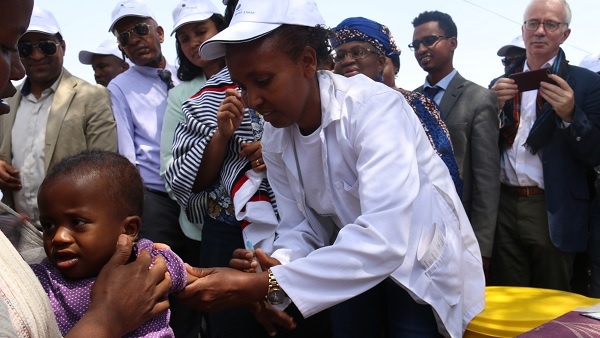
New global estimates by WHO and UNICEF find dangerous stagnation of global rates of measles, diphtheria and tetanus vaccinations, due to conflict, inequality and complacency
NEW YORK/GENEVA/ADDIS ABABA (UNICEF Ethiopia) – 20 million children worldwide and 872,828 children in Ethiopia missed out on lifesaving vaccines such as measles, pertussis, diphtheria and tetanus in 2018, according to new data from the World Health Organization (WHO) and the United Nations Children’s Fund (UNICEF).
Most unvaccinated children live in the poorest countries, and are disproportionately in fragile or conflict-affected states. Almost half are in just 16 countries – Afghanistan, the Central African Republic, Chad, Democratic Republic of the Congo (DRC), Ethiopia, Haiti, Iraq, Mali, Niger, Nigeria, Pakistan, Somalia, South Sudan, Sudan, Syria and Yemen.
According to WHO and UNICEF national immunization coverage estimate, Ethiopia is the fifth country in the world with large number of unimmunized children. In 2018, 872,828 children were not immunized for the third dose of pentavalent vaccine and 1,215,724 children were not immunized with first dose of measles vaccines.
Though vaccination coverages for the first and third dose of DTP containing vaccine (pentavalent) in Ethiopia has increased from 77 per cent in 2010 to 85 per cent in 2018, measles vaccination coverage has shown a negligible decrease, from 64 per cent in 2010 to 61 percent in 2018. And 467,586 children have never been vaccinated at all for measles.
According to the 2016 Ethiopia Demographic and Health Survey report, the three biggest and populous regions of Ethiopia (Amhara, Oromia and SNNPR) constitute 85.5 per cent of unimmunized children. Incidence of unimmunized children (for all basic vaccines that are given in the country), per 100 children, is highest in Afar (80%) followed by Somali (64%) and Oromia (60%).
In addition, with the recent internal population movements, which cause service interruption, the number of unimmunized children in the country is expected to increase.
Continue reading the full press release on UNICEF Ethiopia
